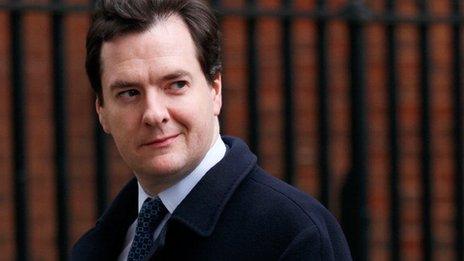A Budget of paradoxes
- Published
- comments

Off course, but determined to stick to it. Having no money to spend, but still able to deliver tax cuts for people and businesses. This was a Budget of paradoxes.
George Osborne was forced to read out a grim set of economic forecasts - the missing of his debt target, the halving of next year's growth forecast and borrowing up this year on one measure and only down on another thanks to an unprecedented and surely unrepeatable underspend by Whitehall departments (£7bn more than last year).
However, none of this convinced him to take the advice of those urging him to borrow more in an effort to stimulate growth by cutting taxes or investing in construction.
Nevertheless, the chancellor did find money from squeezing day-to-day spending to pay for important personal and business tax cuts and a multi-billion pound attempt to boost the construction industry.
This was a very political speech from a man in a very tight economic straitjacket: demonstrating a Brown-like determination to keep control of the economic statistics even though they are now drawn up by independent forecasters; echoing Thatcherite rhetoric on home ownership ("Help to Buy" follows "Right to Buy"); boasting that he would be delivering his tax-cutting objectives (20% Corporation Tax rate and £10k personal tax allowance); claiming to have taken out of tax all those who would pay the 10p tax band Labour have talked about restoring; promising a tighter spending round than expected and inviting Labour to tell the electorate which tax rises they'd like instead.
It will, though, not be judged by the headlines or by the measures or even by the Budget leak* but by whether the next time he stands up the economic news appears to be any better or worse - yet again.
* In reality not so much a leak as a breach by the London Evening Standard of an embargoed pre-Budget briefing